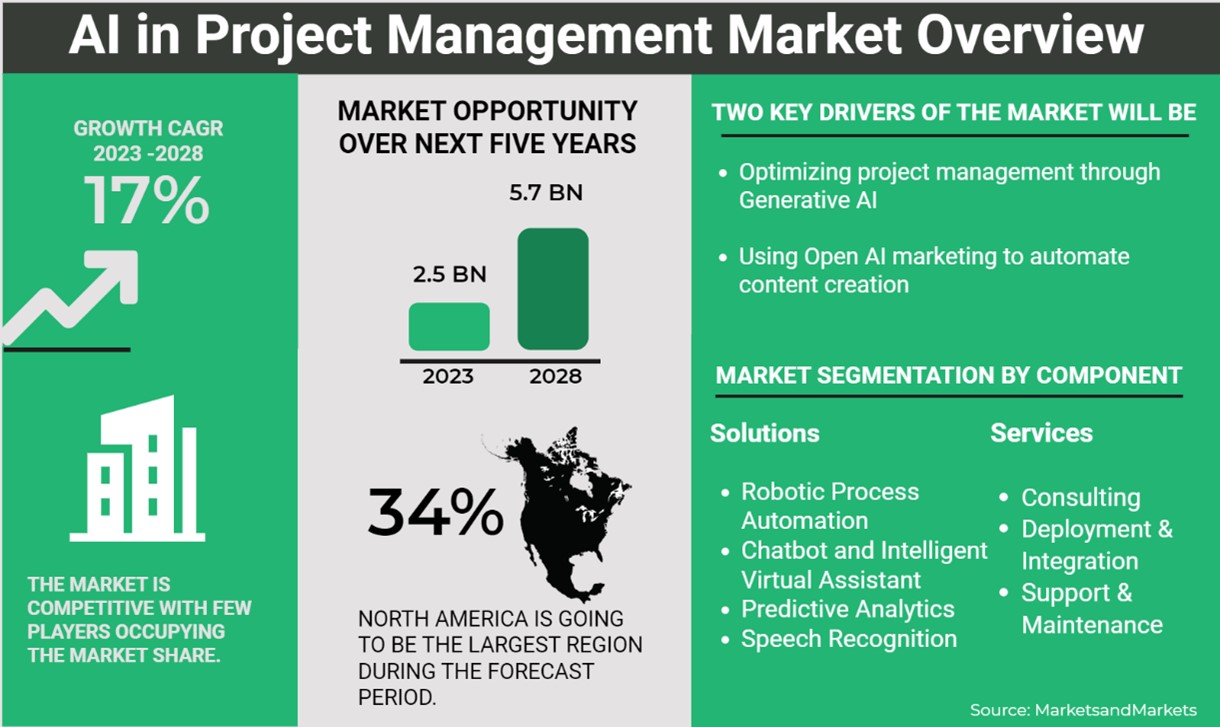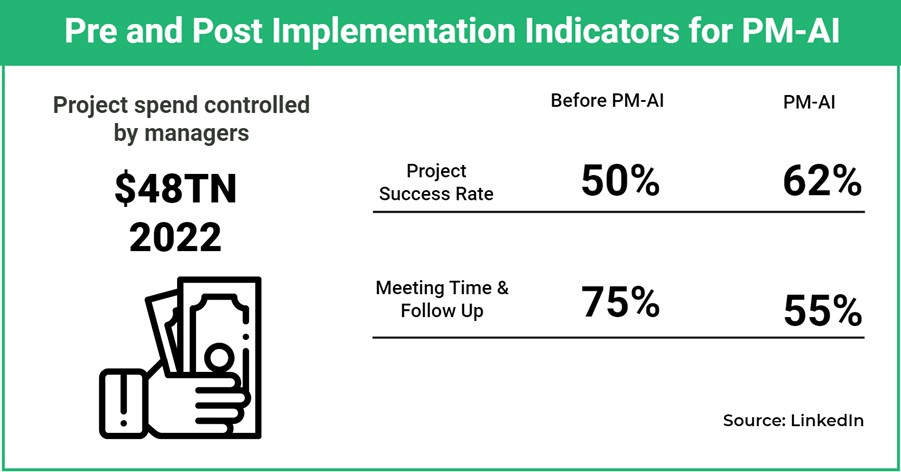
According to a recent Stanford study, 70% of project managers experience high stress levels and burnout due to project complexities. Project management today is more demanding than ever. According to a Stanford study, 70% of project managers experience stress and burnout due to project complexities, communication gaps, and inefficient tracking. Despite digital advancements, many organizations still rely on outdated, reactive methods—addressing issues only after they escalate.
The problem is clear: traditional project management lacks foresight. While teams attempt to stay ahead of deadlines, the absence of real-time risk detection, predictive insights, and AI-driven automation leaves projects vulnerable to delays and cost overruns.
AI in project management is not just an enhancement; it is a necessity. By leveraging predictive intelligence, AI provides early warnings, automates routine processes, and enables leaders to make data-driven decisions. The shift from reactive to proactive management is redefining the way organizations approach project execution.
According to Gartner’s 2019 prediction, by 2030, AI will handle over 50% of project management workloads, allowing leaders to focus on strategic priorities rather than administrative overhead. As AI continues to evolve, its impact on project success becomes increasingly evident.
This article explores the role of AI in project management, its impact on workflows, and how predictive intelligence is shaping the future of project execution.
Project Management Today and the Path Forward
The project management landscape is rapidly evolving, yet many organizations still rely on traditional tools that focus on monitoring progress rather than predicting success. According to a Harvard Business Review report, only 35% of projects meet their original goals, largely due to poor risk visibility, communication silos, and inefficient resource allocation.
AI-driven project management offers a distinct advantage by transforming key processes:
- Real-time project monitoring ensures immediate visibility into risks and performance trends.
- Predictive intelligence detects early warning signs, helping teams take corrective actions before disruptions occur.
- AI-driven automation reduces manual effort, allowing teams to focus on execution rather than repetitive tasks.
- Advanced analytics optimize resource allocation, ensuring project teams work efficiently and strategically.
AI-powered solutions are redefining project selection, risk mitigation, and execution efficiency. Organizations integrating AI today are positioning themselves ahead of the curve, ensuring long-term success in a competitive landscape.
The shift is no longer optional—AI in project management is becoming the industry standard.

AI in Project Management
Artificial intelligence (AI) is a technology that can analyze data, learn from it, and make decisions based on it. AI has many applications in various fields, including project management. Per Grand View Research Report, in 2022, the global AI in project management market stood at a substantial USD 2,226.5 million. It's projected to expand at a compound annual growth rate (CAGR) of 17% from 2023 to 2030. AI technologies are swiftly spreading across various industries, including the project management sector.
AI is transforming project management in the following ways:
- Automated task management – AI streamlines workflows by eliminating repetitive, manual tasks such as scheduling, tracking, and status updates, allowing teams to focus on high-value activities.
- Data-driven project insights – AI analyzes vast datasets in real-time, providing managers with accurate forecasts and actionable intelligence to drive better decision-making.
- Early risk detection – AI-powered predictive analytics identify potential delays, cost overruns, and resource constraints before they escalate.
- Project alignment and prioritization – AI evaluates multiple project variables, ensuring that resource allocation and project execution align with strategic business objectives.
The adoption of AI in project management is no longer a question of if but when. Companies that fail to integrate predictive intelligence into their workflows risk falling behind competitors who are already leveraging AI to enhance project success.
By integrating AI-driven functionalities, organizations enhance agility, improve resource efficiency, and mitigate risks before they impact project timelines. As AI capabilities continue to evolve, project managers who embrace these innovations will gain a competitive advantage in delivering high-performance outcomes.
As organizations look to the future, the ability to harness AI will determine who leads and who lags behind.
See AI in action—watch how AI-driven project intelligence transforms decision-making. Watch Video

What Should You Look for in an AI Project Management Solution?
Selecting the right AI-powered project management solution is critical to achieving seamless execution, real-time visibility, and proactive risk management. While numerous tools claim to offer AI-driven features, businesses must assess solutions based on key functionalities that directly contribute to project success.
Here are four essential capabilities to prioritize:
- Predictive intelligence – The platform should leverage machine learning and AI-driven forecasting to identify risks, predict bottlenecks, and offer proactive recommendations.
- User-friendly interface – AI should simplify workflows, not complicate them. A solution with intuitive dashboards, real-time alerts, and easy-to-use automation ensures adoption across teams.
- Customization and scalability – Projects vary in size and complexity, requiring AI-driven tools that adapt to different project types, workflows, and industry requirements.
- Collaborative intelligence – AI should foster team collaboration through intelligent automation, centralized reporting, and real-time data sharing, ensuring alignment across stakeholders.
An AI-powered project management solution should go beyond standard automation—it must empower leaders with intelligent insights, streamline execution, and drive measurable project success. Businesses that choose a platform with predictive intelligence and real-time analytics will position themselves ahead in an era of data-driven decision-making.
Start leveraging predictive intelligence today. Get a tailored AI-powered project management solution that works for your team. Schedule a Discussion

The Transformational Impact of AI on Project Outcomes
AI is not just an add-on to project management—it is fundamentally reshaping how organizations plan, execute, and monitor projects with precision and foresight. By leveraging predictive intelligence and real-time analytics, AI enhances decision-making, streamlines workflows, and mitigates risks before they impact project success.
The key transformations AI brings to project management include:
- Amplified Decision-Making – AI synthesizes structured and unstructured data, offering insights that enable project managers to make real-time, data-driven decisions instead of relying on outdated reports or manual estimates.
- Strategic Risk Management – AI-driven tools analyze project patterns, detect anomalies, and flag risks weeks in advance, allowing teams to take proactive measures before small issues escalate into major disruptions.
- Enhanced Productivity & Efficiency – Automating administrative tasks, AI reduces the manual workload, enabling teams to focus on high-priority initiatives while improving overall efficiency.
- Optimized Resource Allocation – AI evaluates workload distribution and ensures resources are assigned based on skillsets, availability, and project demands, preventing bottlenecks and balancing workloads dynamically.
- Dynamic Forecasting & Scenario Planning – AI models help project leaders simulate different scenarios and anticipate potential roadblocks, enabling them to adjust plans in real-time rather than reacting when it’s too late.
- Stronger Stakeholder Engagement – AI-powered insights create more accurate, real-time progress reports that align teams and stakeholders, fostering transparency, accountability, and better collaboration.
- Continuous Learning & Adaptation – AI-driven systems continuously refine project workflows and risk models, learning from past project data to improve future predictions and decision-making.
AI shifts project management from a reactive, manual-driven approach to a proactive, intelligent, and strategic discipline. The ability to detect risks early, optimize resources, and provide actionable insights in real-time is becoming the defining factor in achieving predictable, high-performance project outcomes.
Why wait for project inefficiencies to escalate? Take control with real-time AI-powered insights and early risk detection. Start Your QuickStart
The illustration below is based on primary and secondary research by MarketsandMarkets that included an extensive pool of industry leaders, CEOs, CIOs, VPs, Directors, and Marketing Executives from various industries.

How AI In Project Management (PM-AI) Drives Project Success
AI is fundamentally transforming project management from reactive to predictive and strategic, enabling teams to anticipate risks, optimize workflows, and enhance efficiency at every stage. By leveraging predictive intelligence, automated processes, and real-time analytics, AI empowers organizations to achieve project success with greater accuracy and speed.
Here’s how AI is driving measurable impact across key project areas:
-
Streamlining Workflow and Communication
- AI reduces manual workload and redundant processes, ensuring smoother task management and automated follow-ups.
- AI-powered tools improve team alignment, minimizing miscommunication and ensuring stakeholders are always informed.
- Automated workflows and intelligent scheduling prevent bottlenecks and delays by optimizing work sequences dynamically.
-
Boosting Productivity and Project Velocity
- AI-powered automation cuts administrative overhead, allowing teams to focus on high-impact strategic activities instead of repetitive tasks.
- By analyzing real-time project data, AI suggests efficiency improvements, reducing wasted resources and optimizing execution speed.
- AI-enhanced resource planning ensures that workloads are balanced, preventing burnout and improving overall team performance.
-
Strengthening Risk Management and Decision-Making
- AI identifies risks early, flagging issues weeks before they escalate into project delays or cost overruns.
- Predictive analytics helps teams prioritize critical project elements, ensuring focus on high-value deliverables.
- AI-based anomaly detection uncovers hidden risks and inefficiencies, allowing for real-time course correction.
-
Enhancing Knowledge Retention and Learning
- AI captures key insights from completed projects, building intelligent knowledge repositories for future reference.
- Machine learning algorithms continuously refine risk models and project tracking, improving future project planning.
- AI-powered reporting enables managers to spot trends, analyze historical data, and refine best practices.
-
Optimizing Budget and Resource Allocation
- AI-driven financial tracking predicts budget deviations before they occur, reducing the risk of cost overruns.
- Smart resource allocation tools match project requirements with team availability, ensuring optimal utilization.
- AI-backed financial forecasting improves budgeting accuracy, ensuring that financial planning aligns with real-world project conditions.
AI is not replacing project managers—it’s amplifying their capabilities by providing data-backed insights, eliminating inefficiencies, and ensuring that projects stay aligned with business objectives. Organizations that adopt AI-driven project management will gain a competitive edge by reducing risks, improving efficiency, and delivering projects with greater precision.
Turn AI into your project’s competitive edge. Experience how real-time analytics and automation improve outcomes. Take a demo today!

Top AI Technologies Leveraged in Project Management
AI in project management isn’t just about automating tasks—it’s about leveraging intelligence to make informed, strategic decisions. Several AI-driven technologies are leading this transformation, enhancing decision-making, risk mitigation, and resource management.
Here are the top AI technologies revolutionizing project management:
-
Machine Learning for Risk Detection
- Analyzes historical project data to identify patterns that indicate potential risks.
- Learns from previous project failures to refine predictive models, improving future risk mitigation.
- Provides real-time risk scoring, allowing project teams to adjust plans before issues escalate.
-
Predictive Intelligence for Forecasting and Planning
- AI-driven analytics predict project outcomes, enabling proactive adjustments.
- Scenario modeling helps teams assess the impact of changes, ensuring that alternative plans are ready when needed.
- AI refines forecasting accuracy by continuously analyzing project data and external risk factors.
-
Natural Language Processing (NLP) for Communication & Reporting
- AI-powered chatbots provide real-time project updates and assist in answering team inquiries.
- Automated reporting tools generate executive-level insights, translating complex project data into actionable takeaways.
- AI detects sentiment and engagement trends in project communications, ensuring stakeholder concerns are addressed promptly.
-
Robotic Process Automation (RPA) for Workflow Optimization
- Automates manual data entry, approvals, and repetitive reporting tasks, freeing up valuable time.
- Streamlines project coordination by ensuring that tasks are assigned and executed in the right sequence.
- Enhances efficiency by integrating various project tools and systems for seamless workflow management.
-
Decision Intelligence for Strategic Alignment
- AI consolidates project, financial, and operational data to provide holistic, real-time insights.
- Aligns project priorities with organizational goals, ensuring resources are allocated where they provide the highest ROI.
- Supports data-backed decision-making, reducing reliance on guesswork and intuition.
By integrating these AI-powered technologies, organizations can achieve greater transparency, improve project efficiency, and drive stronger business outcomes. The shift from traditional project tracking to AI-powered predictive management is setting a new industry standard for success.
Three Use Cases on How AI in Project Management Is Revolutionizing Businesses
AI in project management is no longer theoretical—it’s actively transforming businesses across industries, driving efficiency, and reducing risks. Leading organizations are leveraging AI to improve project execution, optimize resources, and enhance decision-making.
Here are three real-world examples of AI driving project success:
-
SpaceX: Predictive Maintenance for Aerospace Projects
- AI analyzes spacecraft and launchpad data to predict potential equipment failures weeks in advance.
- Automated diagnostics reduce downtime, ensuring missions stay on schedule and costly failures are avoided.
- AI-driven risk assessment tools enhance safety measures, preventing mission-critical errors.
-
Unilever: AI-Driven Workforce and Task Optimization
- AI algorithms optimize task assignments, ensuring the right resources are allocated to the most critical project phases.
- Predictive workforce planning enables Unilever to forecast hiring needs and balance workloads efficiently.
- AI-powered automation reduces manual reporting overhead, allowing teams to focus on strategic objectives.
-
Lendlease: AI in Construction Project Management
- AI-powered robotic systems automate bricklaying and construction processes, reducing project timelines by up to 50%.
- Smart scheduling ensures optimized resource allocation, eliminating inefficiencies in labor and material usage.
- AI-driven project monitoring identifies potential risks and delays, ensuring projects stay on budget and on schedule.
These real-world examples highlight how AI-driven project management improves efficiency, reduces costs, and enhances project outcomes. The integration of AI is no longer optional—it is the key to future-proofing project management.
Conclusion
AI in project management is no longer an emerging trend—it’s a strategic imperative. Organizations that integrate AI-driven predictive intelligence into their project workflows gain unparalleled foresight, automation, and efficiency, reducing project failures and accelerating success. Data-driven decision-making, real-time risk detection, and intelligent workflow automation are no longer competitive advantages but foundational to project excellence.
For forward-thinking leaders, the shift from traditional project tracking to AI-powered strategic execution is already underway. The ability to anticipate challenges, optimize resources, and align execution with business goals is what separates high-performing enterprises from those struggling with inefficiencies.
This is where TrueProject delivers unmatched value. Unlike conventional project management tools, TrueProject integrates stakeholder sentiment with system data, providing a holistic, KPI-driven approach to project health. Its AI-powered insights, predictive governance, and customizable KPIs ensure teams remain proactive rather than reactive. With early risk detection, actionable recommendations, and real-time adaptability, TrueProject doesn’t just help you manage projects—it ensures you deliver results confidently.
The future of project success is predictive. The future is TrueProject.
AI-driven project management isn’t the future—it’s the present. Don’t fall behind. See how AI transforms project success. Get a Live Demo
More information about TrueProject on trueprojectinsight.com

About the Author:
Nisha Antony is an accomplished senior marketing communications specialist at TrueProject and a leader in predictive intelligence. With over 16 years of experience, she has worked as a Senior Analyst at Xchanging, a UK consulting firm, and as an Internal Communications Manager on a major cloud project at TE Connectivity. She is an insightful storyteller who creates engaging content on AI, machine learning, analytics, governance, project management, cloud platforms, workforce optimization, and leadership.





